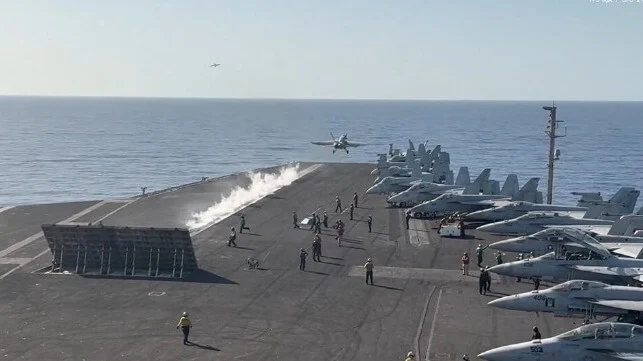Yemen’s Houthi rebels, despite agreeing to a ceasefire with the United States, have claimed responsibility for the downing of a $60 million F/A-18 Super Hornet strike fighter during an attack on the USS Harry S. Truman.
The incident, which occurred on the day of the ceasefire announcement, signals a rocky start to the peace agreement.
According to Houthi spokesman Yahya Saree, the group executed a “specific military operation” targeting the U.S. aircraft carrier and several of its accompanying warships in the northern Red Sea.
Saree claimed the operation involved ballistic missiles and drones, leading to what he described as a “state of confusion and panic” aboard the carrier. He further asserted that the attack thwarted a planned U.S. airstrike and resulted in the downing of the F/A-18.
U.S. defense sources have confirmed the loss of the aircraft, but attributed it to a technical failure of the carrier’s arresting gear during landing. Anonymous Pentagon sources speaking to CNN and AP stated that both pilots successfully ejected and were rescued from the water. Saree’s claims, while dramatic, remain unverified and have been inaccurate in the past.
If confirmed, this would mark the second loss of an F/A-18 to Houthi-related incidents. Just last month, another Super Hornet rolled off Truman’s hangar deck elevator during evasive maneuvers aimed at avoiding incoming Houthi threats. One crew member was injured, though no fatalities occurred.
Houthi Attacks on Israel to Continue Despite Ceasefire
Houthi leadership has separately announced that its attacks against Israeli targets will persist, regardless of the ceasefire with the U.S. In a statement, top Houthi leader Abdul-Malik al-Houthi emphasized that the group’s aggression towards Israeli interests would not cease, and he reaffirmed that the United States remains an adversary.
“The aggression against our people’s interests proves that the Israeli and American enemies are enemies of our people in general,” said al-Houthi.
Despite being a close U.S. ally, Israel was reportedly left out of the loop regarding the ceasefire agreement, a move that has raised concerns within the Israeli government. Speaking to The Jerusalem Post, Israeli Prime Minister Benjamin Netanyahu expressed Israel’s willingness to defend itself independently if necessary.
“Israel will defend itself by itself,” Netanyahu said. “If others join us—our American friends—all the better. If they don’t, we will still defend ourselves on our own.”
U.S.-Iran Negotiations Influence Ceasefire
The ceasefire comes amidst ongoing U.S. negotiations with Iran, reportedly brokered by the Sultanate of Oman without Israeli involvement. Iranian officials have claimed responsibility for pressuring the Houthis into the ceasefire to smoothen nuclear treaty talks with Washington. Iran, a primary backer of the Houthi rebels, is said to be aligning its strategic interests to facilitate dialogue with the White House.
“President Trump’s decision to halt attacks against the Houthis effectively leaves Israel alone in the campaign against the Yemeni terrorist organization,” said Danny Citrinowicz, a research fellow at the Institute for National Security Studies, speaking to the Times of Israel. “It is a further indication and reminder that the administration is working to realize its interests even if these do not coincide with the interests of the Israeli government.”

